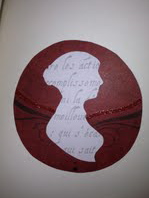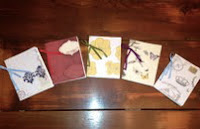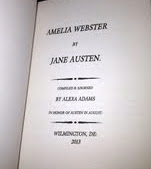Please welcome back a familiar face to Austen in August - Alexa Adams has been part of my Jane Austen events since the beginning, and you'll be hearing from her (and from me, about her books) a number of times over the next two weeks. But today is the first of her AIA posts, as she joins us to talk about Amelia Webster, a silly bit of Austen's juvenalia. To go along with this, Alexa has bound these silly bits into "Elegant Extracts," or handmade little folios, which you can win below!
One of the most consistent principals Jane Austen advocates in her novels is the importance of judging a person's character by their deeds, not their words. Thus the Wickhams and Willoughbys reveal themselves as hypocrites, while the Mr. Darcys prove themselves true gentlemen. The epistolary novel (or novel in letters), in providing nothing but a series of first person voices, is an excellent format to explore this dynamic, and I think it no coincidence that Austen’s only surviving epistolary novel (Sense and Sensibility, and probably Pride and Prejudice, too, were originally composed entirely in letters) is about her most despicable heroine. Lady Susan bears more resemblance to a Becky Sharp or Scarlet O’Hara than Austen’s major heroines, and in reading both her personal correspondence and the letters of her relations, we get a brilliant picture of a woman perfectly fascinating in her despicability.
The epistolary format was extremely popular in the 18th century, and Samuel Richardson (author of Pamela, Clarissa, Sir Charles Grandison, and a major influencer of Austen) remains famous for it. Several of Austen’s earliest writings, compiled into three volumes of juvenilia, are composed of letters. All of Jane’s juvenilia is absolutely delightful, revealing a child of piercing wit, with a surprisingly modern appreciation for the absurd, and an almost reckless irreverence. This last quality is almost completely checked in her major novels (though it lived on in her letters), only peeking out at us on occasion:
"Indeed, Mr. Bennet," said she, "it is very hard to think that Charlotte Lucas should ever be mistress of this house, that I should be forced to make way for her, and live to see her take my place in it!"
"My dear, do not give way to such gloomy thoughts. Let us hope for better things. Let us flatter ourselves that I may be the survivor."
The personalities on display in Austen’s juvenilia tend to be far more blatant in their contradictions and villainies than those more developed characters who inhabit her novels, and the epistolary style easily adapts itself to their exposure. “Amelia Webster,” possibly her earliest attempt at such composition, shows Austen playing with the structure of this format. It is an extremely short piece, only seven letters in all, but it is long enough to see no less than six people happily married. The very speed with which these events occur are open for satirical interpretation, and the few lines of composition are sufficient to display several of the themes that define Austen’s later work, but for the sake of keeping this post concise, let’s focus just on what she reveals about the characters, particularly regarding their sincerity. Here is the text complete. It’s a quick read and worth a laugh. A few helpful hints - Maud is short for Matilda, and Miss S. (Sarah) Hervey is Miss (Matilda) Hervey’s younger sister:
Amelia Webster
an interesting and well written Tale
is dedicated by Permission
to
Mrs Austen
by
Her humble Servant
The Author
Letter the first
To Miss Webster
My dear Amelia
You will rejoice to hear of the return of my amiable Brother from abroad. He arrived on Thursday, and never did I see a finer form, save that of your sincere freind
Matilda Hervey
Letter the 2d
To H. Beverley Esquire
Dear Beverley
I arrived here last Thursday and met with a hearty reception from my Father, Mother and Sisters. The latter are both fine Girls—particularly Maud, who I think would suit you as a Wife well enough. What say you to this? She will have two thousand Pounds and as much more as you can get. If you don't marry her you will mortally offend
George Hervey
Letter the 3d
To Miss Hervey
Dear Maud
Beleive me I'm happy to hear of your Brother's arrival. I have a thousand things to tell you, but my paper will only permit me to add that I am yr affect Freind
Amelia Webster
Letter the 4th
To Miss S. Hervey
Dear Sally
I have found a very convenient old hollow oak to put our Letters in; for you know we have long maintained a private Correspondence. It is about a mile from my House and seven from yours. You may perhaps imagine that I might have made choice of a tree which would have divided the Distance more equally—I was sensible of this at the time, but as I considered that the walk would be of benefit to you in your weak and uncertain state of Health, I preferred it to one nearer your House, and am yr faithfull
Benjamin Bar
To Miss Hervey
Dear Maud
I write now to inform you that I did not stop at your house in my way to Bath last Monday.—I have many things to inform you of besides; but my Paper reminds me of concluding; and beleive me yr ever &c.
Amelia Webster
Letter the 6th
To Miss Webster
Madam Saturday
An humble Admirer now addresses you.—I saw you lovely Fair one as you passed on Monday last, before our House in your way to Bath. I saw you thro' a telescope, and was so struck by your Charms that from that time to this I have not tasted human food.
George Hervey
Letter the 7th
To Jack
As I was this morning at Breakfast the Newspaper was brought me, and in the list of Marriages I read the following.
'George Hervey Esqre to Miss Amelia Webster.'
'Henry Beverley Esqre to Miss Hervey'
&
'Benjamin Bar Esqre to Miss Sarah Hervey'.
yours, Tom
Finis
Miss (Matilda) Hervey begins the story, and we only hear from her this once. In two short sentences she displays a pleasing affection for her brother, makes an assumption that her friend, Miss Webster, will share in her enthusiasm, and reveals a tendency towards egoism. In the third letter Miss Webster replies, and while she professes her joy at Mr. Hervey’s arrival, the abbreviated nature of her letter shows that she can’t be bothered very much by it, a sentiment reinforced in the fifth letter, which she again rushes, written only to confess she couldn’t be troubled to visit when she drove right past the Herveys’ house. Either both sister and brother mean very little to her (a suspicion overruled by her eventual union to the latter), or she is playing a very deep, coquettish game. Miss Hervey’s words are like a prelude for Isabella Thorpe, Lucy Steele, Caroline Bingley, Mary Crawford, Mrs. Elton, and Mrs. Clay. False and manipulative friends are not to be trusted.
George Hervey, like Matilda, seems fairly amiable, though prone to exaggeration. His ready desire to marry his sister off to his friend, sight unseen and with only a dowry to recommend her, is far too commonplace in this society to reflect poorly. The siblings’ mutual affection speaks more to the good character of both than anything else, but Austen is definitely mocking Mr. Hervey’s excessive sentimentality in the sixth letter (a quality she thoroughly critiques in the character of Marianne Dashwood). To be so in love that he starves himself upon the mere sight of a lady’s carriage is no small character flaw, and we can but hope he resorted to animal foods in lieu of human.
Benjamin Bar, on the other hand, in carrying on a secret correspondence with Miss Sarah Hervey, immediately casts doubt on his gentlemanly status. While his eventual marriage saves him from being a complete scoundrel, his arrangements regarding the tree prove him consumed by self-interest, and we must question what is lacking in Sarah to have agreed to such clandestine behavior (which poses a threat to not just her own, but her entire family’s future, as we learn from Lydia Bennet) with a man such this. Hear the echoes of Henry Crawford and Maria Bertram? May the Bars find more happiness in their mutual selfishness than that sorry couple.
 It matters little who the Jack and Tom of the seventh letter might be, for they serve only to inform us of the apparently happy ending for all. Maneuvers and machinations are trivialized by the rapidity of the conclusion, but we can be thankful that Miss Webster did not allow Mr. Hervey to starve himself to death. While the plot of “Amelia Webster” may not be terribly fulfilling, it certainly illuminates Austen’s burgeoning genius, providing ample red meat for Janeites to sink their teeth into. I have long wanted to print and bind a piece of Austen’s juvenilia into one of my Elegant Extracts, small folios I handmake in homage to my muse. “Amelia Webster” seemed the perfect candidate, and Austen in August the ideal opportunity. Thanks for including me, Misty! May my little books make their way to happy homes.
It matters little who the Jack and Tom of the seventh letter might be, for they serve only to inform us of the apparently happy ending for all. Maneuvers and machinations are trivialized by the rapidity of the conclusion, but we can be thankful that Miss Webster did not allow Mr. Hervey to starve himself to death. While the plot of “Amelia Webster” may not be terribly fulfilling, it certainly illuminates Austen’s burgeoning genius, providing ample red meat for Janeites to sink their teeth into. I have long wanted to print and bind a piece of Austen’s juvenilia into one of my Elegant Extracts, small folios I handmake in homage to my muse. “Amelia Webster” seemed the perfect candidate, and Austen in August the ideal opportunity. Thanks for including me, Misty! May my little books make their way to happy homes.****GIVEAWAY****
 Author Alexa Adams has designed and handmade three "Elegant Extracts" of Jane Austen's Amelia Webster, pictures of which can be found throughout this post, and is offering them up to three lucky Janeites! This giveaway is international!
Author Alexa Adams has designed and handmade three "Elegant Extracts" of Jane Austen's Amelia Webster, pictures of which can be found throughout this post, and is offering them up to three lucky Janeites! This giveaway is international!Ends September 7th, 12a EST. Fill out the Rafflecopter below to enter.
Please note: As with all Austen in August giveaways, you must fill out the giveaway registration form here in order to enter. This only has to be done once, and then you are free to enter all giveaways. Invalid entries will be deleted. Please do not leave any sensitive info or email addresses in the comments! Thanks!
a Rafflecopter giveaway
 |
| Click the pic to be taken to the Austen in August Main Page! Thanks to faestock & inadesign for the images used to create this button. |



Sadly, I have been lax in reading the Juvenlia. I thought I was big stuff to have read the novels along with Lady Susan, but I really must get on to the rest. I've never read an epistolary style story so I found it fascinating. Thank you Alexa for pointing out the pertinent points. I caught some, but missed others.
ReplyDeleteI love the crafty prizes. Thanks for the opportunity to win one.
I have only read Lady Susan, but have read Samuel Richardson's Pamela and Clarissa. I find it takes more concentration to get into these books but once I get the hang of it I am okay
ReplyDeleteI haven't read much of Austen’s juvenilia. I need to investigate further. A great post thank you.
ReplyDeletei have yet to read Austen's juvenilia....will definitely add to my WishList!!!
ReplyDeleteI've yet to read the juvenilia. this post has me interested though :)
ReplyDeleteI've yet to read the juvenilia. this post has me interested though :)
ReplyDeleteI have the Oxford edition of the juvenilia, and I've read several pieces but not Amelia Webster. I love how ridiculously funny they are, like Love and Freindship.
ReplyDeleteI haven't read any of her Juvenilia but I would really love to... adding to my tbr :)
ReplyDelete